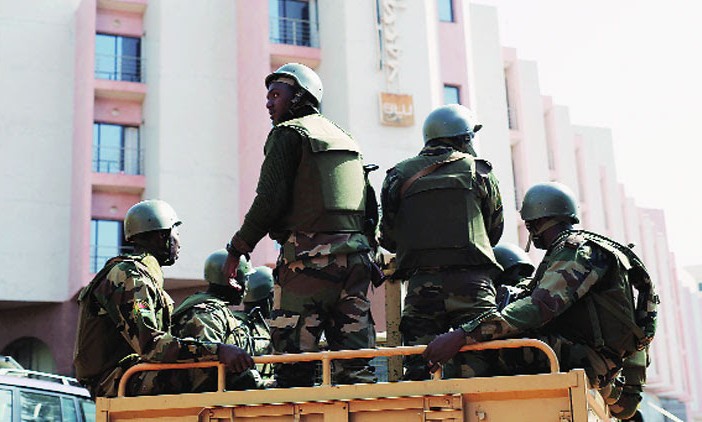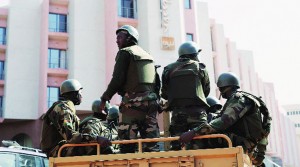The Indian EXPRESS
AP
Malian security forces outside the Radisson Blu in Bamako, Mali, after Islamist terrorists stormed the luxury hotel and took hostages on November 20.
In 1509, at the end of a long journey across the sands of the Sahara, Mohammed al-Zayati, a 16-year-old student from Fez, came upon a magnificent city — spices, rare foodstuffs and slaves were being bought and sold, paid for with cowrie shells and nuggets of gold. “There are numerous artisans’ workshops, merchants, and weavers of cotton cloths”, he wrote. “The cloths of Europe reach Timbuktu, brought by Barbary merchants.”
Timbuktu, the 17th century manuscript Tariqh al-Sudan recorded, was in its heyday “a refuge of scholarly and righteous folk, a haunt of saints and ascetics, and a meeting place for caravans and boats”.
Last week, when terrorists struck at the Radisson Blu in Mali’s capital, Bamako, few paid attention — their vision was still focussed on the massacre in Paris. But the attack should have reminded the world just what the war against Islamist violence is about: savagery can only too easily bury in the sand the great achievements of great civilisations.
In 2013, al-Qaeda in the Islamic Maghreb had swept south across the Sahara, capturing Timbuktu, and pillaging its antiquities. The jihadist surge was rolled back by French military power at the gates of Bamako — but the attack on the hotel makes clear jihadist energies are very far from spent.
This year alone, al-Qaeda’s regional affilaite, al-Mourabitoun, has bombed a nightclub in Bamako, killed United Nations staff at a hotel in Sévaré, and killed over 10 peacekeeping troops — making the UN peacekeeping mission in Mali the most dangerous active-service deployment today.
Last week’s attack was meant to signal that al-Qaeda could hit France, just as their competitor, the Islamic State, did in Paris — but without harming Muslims. In the hours before United States special forces put an end to their lives, the terrorists freed 80 hostages who were able to recite verses from the Quran.
The attackers may have been foreigners: Guinean music star Sekouba “Bambino” Diabaté said he overheard attackers speaking English “in what seemed like a Nigerian accent”.
Led by Mukhtar Belmokhtar, a veteran African jihadist loyal to al-Qaeda chief Ayman al-Zawahiri, the organisation has deep roots in the global jihadist movement. In 1993, Belmokhtar returned home from the Afghan jihad to fight Algeria’s secular, but authoritarian, military government. The war claimed tens of thousands of lives before the jihadists were defeated.
Even as other Algerian jihadists headed towards France and the United Kingdom — among them, Djamel Beghal, mentor to Paris massacre architect Abdelhamid Abaaoud and Charlie Hebdo attacker Chérif Kouachi — Belmokhtar retreated into the desert.
He raised millions for the jihad by capturing control of cigarette smuggling routes across the Sahel, and kidnapping western tourists for ransom. He also developed formidable local contacts, marrying women from four different, warring tribes.
Al-Qaeda’s central command bemoaned his tactics, and at one stage removed him from his position. But then, in January 2013, Belmokhtar shot back into global prominence with an attack on the Amenas gas facility in south-eastern Algeria. That May, he staged a complex suicide attack in Niger, targeting a uranium mine.
He was helped, ironically enough, by France and its Western allies. Tuareg mercenaries from northern Mali, who had served with Colonel Muammar Gaddafi’s military, were made jobless by the Western attack on Libya. They joined an insurrection against the Mali government, led by the Movement for Unity and Jihad, or MUJAO.
MUJAO needed Belmokhtar’s tactical skills, as well as his smuggling contacts, to move weapons from Libya across the Sahel. The deal led the two organisations to merge.
Early this summer, al-Qaeda announced Belmokhtar would command its new West Africa organisation, al-Murabitoun, carved out of al-Qaeda in the Islamic Maghreb. The decision, experts speculate, may have been intended to counterbalance the decision of Nigerian jihadist group Boko Haram to affiliate with the Islamic State. In March, Boko Haram leader Abu Bakr Shekau swore fealty to Islamic State “caliph” Abu Bakr al-Baghdadi, and rebranded the group the Islamic State in West Africa.
In the statement announcing its formation, al-Murabitoun distinguished itself from “what the State of al-Baghdadi and its leaders have done in terms of fragmenting the ranks of the mujahideen and shedding the inviolable blood of Muslims”.
The organisation instead called on jihadists around the world to “unify under one word and one banner, to restore the rightly-guided caliphate. It reiterated its commitment to the “guidelines of the imam of the era in jihad, Sheikh Osama bin Laden”.
Al-Murabitoun, the statement ended, would focus “on expelling the Crusader enemy that occupies our land, including France and its assistants, and to target them everywhere”.
The new organisation’s birth shows that proclamations of Western victory notwithstanding, the jihadist movement has grown since 9/11. Today, large parts of the globe are home to al-Qaeda insurgencies which did not exist then: al-Qaeda in the Arabian Peninsula, al-Qaeda in the Islamic Maghreb, al-Shabaab in Somalia, al-Nusrah in Syria, and al-Qaeda in the Indian Subcontinent.
In each case, the organisation is run by a regional commander who has sworn an oath of allegiance to Ayman al-Zawahiri, but is able to operate independently of the central leadership.
AQIM has operated in West Africa, but al-Murabitoun may be seeking to establish itself as the preeminent al-Qaeda organisation in the region. Regardless, the organisation was already part of al-Qaeda.
The lesson is a simple one: the case of al-Qaeda shows that even if the Islamic State is decimated in its heartland by the multinational coalition now bombing its forces, this may not mean the end of the death cult it represents. Like al-Qaeda survived the destruction of its command centres in Afghanistan, the Islamic State could fight on.
For world leaders, this is bad news: as memories of each jihadist massacre wane, public appetite for expensive, bloody wars diminish. Led to believe that air power can deliver decisive victories, the Western world has little stomach for grinding wars of attrition.
The case of Mali, though, demonstrates just how necessary it is to be willing to conduct such campaigns: the alternative is the emergence of jihadist empires, from where mass slaughter can be launched.
praveen.swami@expressindia.com








